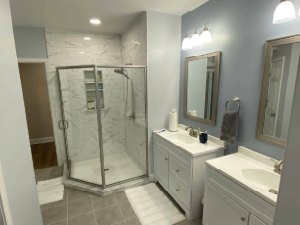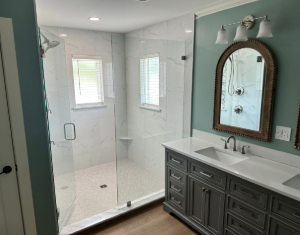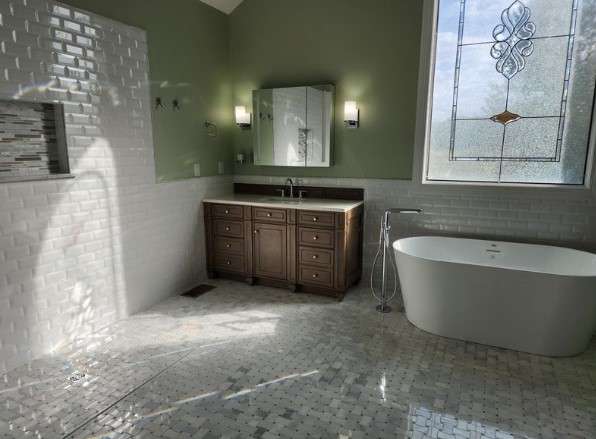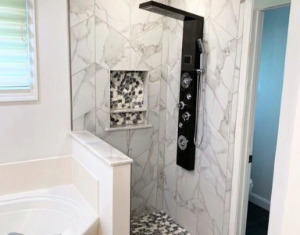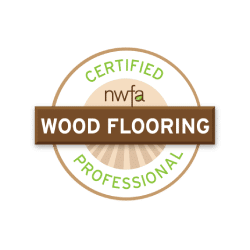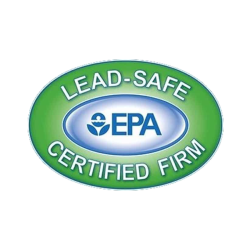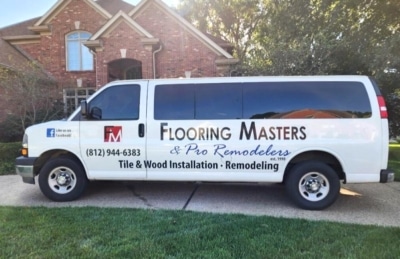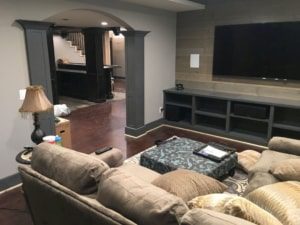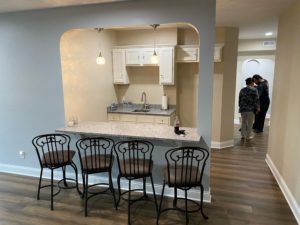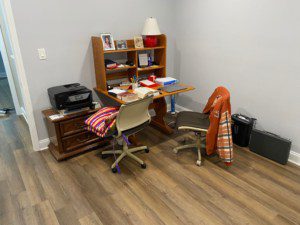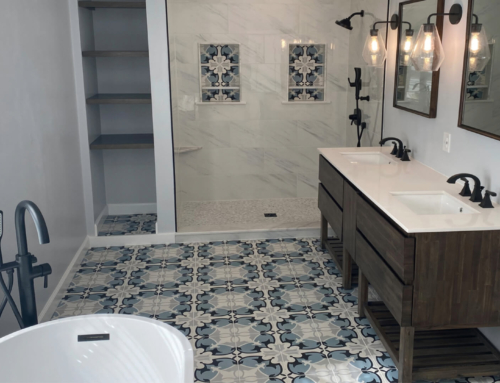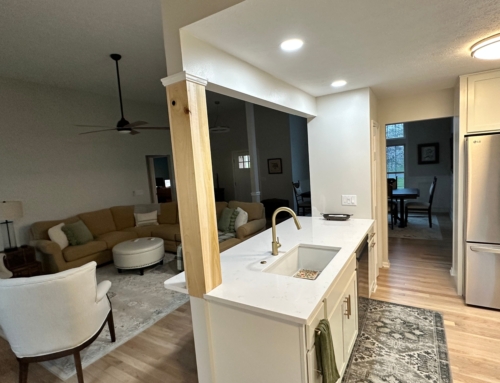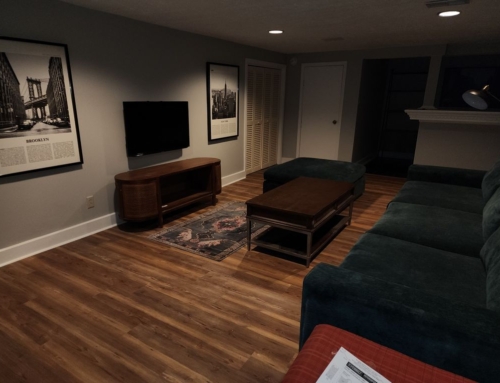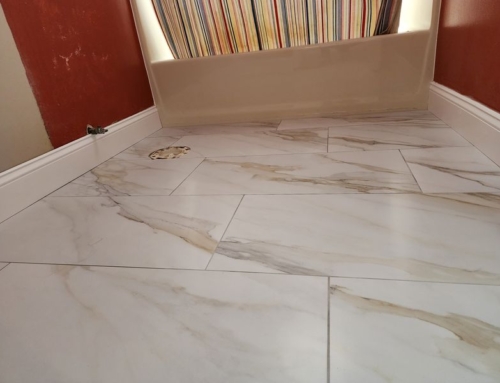Remodeling your basement into something much more than a concrete slab for storage and laundry is the best option to improve the value of your home. Not only does it increase livable space, but depending on what you decide to build, your home can become much more functional. Home gyms, home offices, a bar, or in home theater are all popular, functional, and great options. But if you are reading this article, you already know what you are going to do with your basement. The question is, what are the best basement floor ideas for what your basement is about to become? 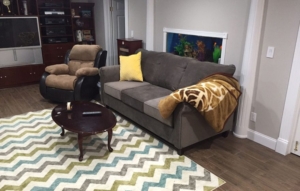
Best Finished Basement Floor Idea – Ceramic Tile
Before you finish your basement, you have to make certain that your foundation is sealed and going to be free of moisture. However, even the best built basements still carry the risk of water damage and moisture problems. For this reason, we always recommend ceramic tile for a basement floor.
Tile outperforms all other basement floor ideas. It is durable, moisture is never an issue, and it comes in a variety of shapes, colors, patterns, and sizes to create a tile design just for you. It can be laid directly on the concrete slab, but we always install a membrane between the concrete slab and the basement floor so that they can expand and contract independently. This keeps your new flooring from being pulled apart by the concrete slab.
In addition, basement floors are cool year round, so we always advise our customers to consider installing radiant heating in their basement’s floor. Another great way to combat the cool floor is by laying out an area rug. Porcelain and natural stone tile also make great basement flooring. Consult with us, or your flooring experts to determine what type of tile suits your needs best. Tile flooring is the best flooring for your basement.
If you need some more information about choosing tile for your finished basement, you can read about ceramic tile trends we love in 2022 here.
Ceramic Tile Cons
- Tile is noisy.
- Your concrete slab may need to be leveled and repaired first.
- It is more difficult to remove than other flooring if you remodel your basement in the future..
Wood-Like Ceramic Tile Planks
For a homeowner who wants hardwood floors, but is worried about moisture, wood-like ceramic tile planks are one of the best options for basement flooring. You get the beauty of hardwood flooring, but with the durability and moisture resistance of ceramic tile. It’s a win-win for homeowners finishing their basements.
Concrete Flooring
As a basement floor idea, concrete with a nice finish on it is the least hassle for the homeowner. You may also choose to use concrete paint to finish it. A stained and polished cement basement floor resembles marble, and works with any type of room. In addition, a concrete or cement floor carries no worries if the basement gets water damaged.
The cons for cement floors are that they are cold and noisy. You can quiet them by soundproofing your ceiling and walls. Spreading out some rugs can help with the cold. In addition, cement expands and contracts with temperature changes, and the earth may settle or shift around your basement, causing cracks in the concrete. If you intend to finish your basement into a cozy getaway, this may not be the best option for you. A basement workshop works perfectly with a cement floor.
Rubber Basement Floor
If you are finishing your basement for utilitarian reasons, such as a home gym, workshop, or playroom, rubber flooring is also a great option. It can eliminate the need for mats, and is water resistant. Very important in any basement. However, a basement home gym and playroom work just as well with a cement floor and some mats.
Engineered Wood
Solid hardwood is a bad basement floor idea. It is guaranteed to be damaged by moisture, but engineered wood is a safer bet. The plywood below the gorgeous solid hardwood veneer stands up to moisture and temperature fluctuations, and can make a great alternative in this situation. It will not stand up to flooding, but you wouldn’t be finishing your basement if this was a risk. You get the gorgeous look without the moisture damage. However, you can only refinish engineered wood a couple of times before you have to replace it. If you are looking for longevity, this may not be the best choice. Another con for engineered wood is you will have to install a subfloor before it can be installed.
Vinyl Plank or Vinyl Tile Flooring
Luxury vinyl plank flooring and luxury vinyl tiles have come a long way over the years, and are a great basement floor idea. The days of gluing sheet vinyl flooring down to a subfloor are over. Water resistant, basement ready vinyl planks snap together as a floating floor like laminate flooring and looks just as good. Once again, you can get the look of hardwood without worrying about moisture. In addition, the floating floor will not crack as temperatures cause your concrete slab basement to swell and contract. Don’t overlook luxury vinyl tile that replicates stone tile. This is just as beautiful in the basement, and can save on costs. Vinyl tiles have a lower cost per square foot than ceramic or stone, are durable, and should be considered.
You can read more about luxury vinyl plank and tile formats here.
Cons for Luxury Vinyl Plank and Tile
- Higher cost than sheet vinyl.
- It requires a subfloor, has seams, and may leak moisture onto subfloor.
- Could potentially hurt resale value. Some people view vinyl as an inferior flooring.
Laminate Flooring
Like engineered wood, laminate is a composite material similar to plywood. It is much more moisture resistant than solid hardwood, and may be installed in the basement as a safer alternative. However, a subfloor must be installed and floating floors can potentially leak moisture onto the subfloor through their seams. It comes in at a lower cost per square foot than engineered wood, but still has a great look.

